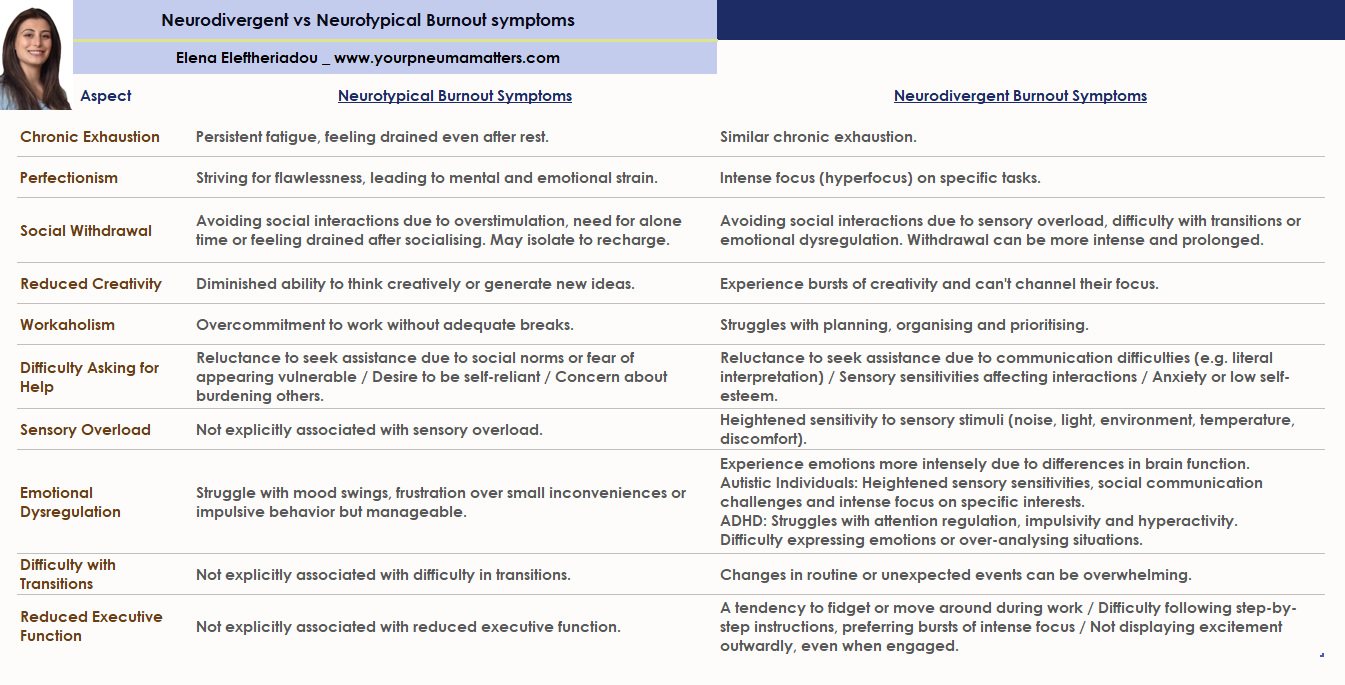
Burnout in neurodivergent individuals, such as those with Autism Spectrum Disorder (ASD), Attention-Deficit Hyperactivity Disorder (ADHD), Dyslexia, Dyspraxia (Developmental Coordination Disorder), Dyscalculia, Tourette Syndrome, Obsessive-Compulsive Disorder (OCD), Bipolar Disorder, Sensory Processing Disorder (SPD), Synesthesia and other differ significantly from burnout in neurotypical individuals. While neurotypical burnout often stems from prolonged work-related stress, neurodivergent burnout can be triggered by a broader range of factors. These include the constant effort to mask or conform to neurotypical standards which can be mentally and emotionally exhausting. Neurodivergent individuals may also experience heightened sensory sensitivities making everyday environments overwhelming which contribute to burnout.
Social interactions can also be particularly draining for neurodivergent individuals leading to increased stress and fatigue. Executive dysfunction, which involves difficulties with planning, organising and completing tasks, can further exacerbate burnout.
Unlike neurotypical burnout, which is often limited to professional settings, neurodivergent burnout can affect all aspects of life, including personal and social domains.
Symptoms of Neurodivergent Burnout
Physical Symptoms:
Feeling persistently tired, no matter how much rest you get.
Suffering from headaches, stomach issues and other stress-related illnesses.
Experiencing physical fatigue that doesn’t improve with rest.
Having trouble sleeping, either insomnia or excessive sleeping.
Struggling with changes in appetite, either eating too much or too little.
Mental Symptoms:
Becoming more sensitive to sounds, lights and other stimuli.
Struggling with tasks that were previously manageable.
Experiencing heightened anxiety, depression, or irritability.
Having difficulty with memory and concentration.
Feeling a significant drop in motivation or interest in activities you once enjoyed.
Experiencing frequent mood swings or emotional outbursts.
Feeling overwhelmed by even small tasks or decisions.
Feeling a lack of accomplishment or self-worth.
Spiritual Symptoms:
Feeling detached or disconnected from your surroundings.
Experiencing a sense of numbness or emotional flatness.
Feeling isolated or withdrawing from social interactions.
Feeling a sense of hopelessness or being overwhelmed by daily tasks.
Struggling with self-care routines and personal hygiene.
Feeling a heightened sense of frustration or anger.
If you recognise these symptoms in yourself it might be time to seek support.
As a therapist and coach specialising in neurodivergent burnout, I offer a compassionate and personalised approach to help you navigate your unique challenges. Together we will develop strategies to manage stress, build resilience and create a balanced life that honours your neurodivergent identity. My goal is to provide a safe and supportive space where you can explore your experiences, gain insights and find practical solutions to improve your wellbeing.
Would you like to book an appointment or learn more about my services?
Are You Ready To Start?

